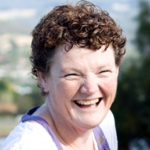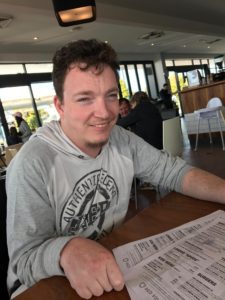 Published in PEPTalk December 2017 as The Hill Report
Published in PEPTalk December 2017 as The Hill Report
By Sheree Hill
I’m going to take the focus away from the Hill family in this piece and seek your indulgence as I write about the N.D.I.S.
I understand, as a Board member of A.C.D. Tas., that about 50% of families accessing A.C.D. are struggling with the N.D.I.S. and particularly its processes. My family story with the N.D.I.S. is mainly a positive one and something I wanted to share.
My son Matthew was a Participant in the trial group in Tasmania, and I can report that our introduction to the scheme was mostly encouraging, apart from a few bumps in the initial contact
during the planning stage. At the beginning we were very confused and uncertain about what the N.D.I.S. would offer so we attended information sessions run by the N.D.I.S.
We knew we were entering into a brave new world and taking part in a reform, probably equal to importance and scale of the 1984 universal health care reform, Medicare. Matthew, as a participant of the N.D.I.S. was told that he would have access to many needed services and supports and that he would have choice and control about the one’s he wanted to use and that the N.D.I.S. funds would assist him to pay for needed specialist services and work toward his goal of becoming more independent. So, all very promising.

However, it wasn’t all good during the trial period, one of our major hurdles came when Matthew, as an independent young man, chose not to attend his planning meetings. Nothing against the planner, who was a fantastic person; very friendly and informed about disability and understanding of the important role of family. Matthew just did not have the patience to sit and explain his needs and his future wishes and goals. As far as he was concerned, when he said “talk to mum”, he meant “talk to mum, she knows what I want”.
This became our first real hurdle because the scheme is designed to listen to the person with disability if they are over 18. The N.D.I.S. have a formal process that you must undertake to become a Nominee. You can find information about this at Appointing a nominee | N.D.I.S.
We found out that Matthew could nominate his parents as his representatives and that the process involved paperwork and a meeting; both things that Matthew did not want anything to do with. So after jumping through a number of hoops and proving that Matthew, his Dad and I were who we said we were, and that Matthew chose for his Dad and I to be his voice to the N.D.I.A., we were finally declared as Nominees.
The next steps we took were in the planning. We reviewed the services we received and then thought about the services we needed, now and into the near future. Try A.C.D. VIC’s great planning tips.
Choice and control became our new mantra. I started to realise at this stage that I was lucky in the sense that I have a great knowledge of the Disability sector in Tasmania; through paid, volunteer and lived experience as a carer. It made me realise though that this new system could prove very challenging to others and that they would need a helping hand, and especially with knowing what they can ask for and how to implement their plan when they receive it.
Tip Number 1 for planning – Ask for the world. No seriously I do mean that! To you it seems like the world because you have not had your child’s needs met yet, and you are used to this. You are used to not asking for things and not looking forward because you don’t want to get disappointed or knocked back. So, start to make notes, lots of notes, make lists of services you already access and services that you think you may need to access in the future. Make lists of equipment and services that are important and necessary for you as a family. Research options that have had a positive impact on people living with the condition or disability that your son or daughter lives with. Ask the planner (and anyone else you can think of) for advice.
Talk to the service providers that you already access as they can give you a list of relevant item numbers and the amount of hours used and the cost of funding this support. This will be useful and important information when you speak to your planner.
Read the N.D.I.S. price guide. It gets updated regularly, so keep checking back every so often.
Once Matthew had a plan, the next thing we had to learn was how to source service providers. We already had Community Access providers but we had to ask ourselves the questions, were they providing us with what we wanted and did we wish to look around at what else was available? Matthew’s first plan enabled him to have Community Access support and a small amount of respite. He had a wheelchair and a walking frame funded through another source. Matthew accessed the Community Rehabilitation Unit for Physio but as he was over the age of 18 this did not provide him with the regular Physio and Occupational Therapy required. So, this was not the best funded option as it was too hit and miss and we needed to evidence a new issue every time to gain access to a series of treatment.
These days, Matthew’s plan looks very different. He has a solid treatment plan that is funded by the N.D.I.S. and we as a family have been given the control to find and choose a service that provides comprehensive treatment options. Matthew can access his Physio, Hydrotherapy, Occupational Therapy and Speech Therapist under one roof and his allied health professionals can all liaise with his specialists. Botox injections are also included in Matthew’s plan, so his health care team liaise with the Specialist at the hospital, sharing information easily for the benefit of Matthew. Matthew utilises staffing and services from 3 disability specific service providers to receive Community Access, Literacy Education, and Independent Living and Capacity Building training.
As well as services and allied health therapies Matthew can also access equipment to meet his mobility needs. Equipment can be very expensive and previously our family budget needed a lot of reshaping to ensure that we could afford it all. With assessments and recommendations from Physios, Occupational Therapists’ and doctors we were able to provide evidence to the N.D.I.A. (agency) planners to assist them to understand the reasons behind our requests for new equipment. Prior to meeting with the agency planner we researched different brands of wheelchairs to ensure a fit for purpose chair for Matthew and during our search for the wheelchair we located a new brand of walking frame that provided better support and would assist Matthew to maintain mobility. Matthew also purchased a trike to assist with Physio and to build up his leg muscle strength. The N.D.I.S. made it possible for Matthew and his Dad and I to take control and explore other options more suited to Matthew’s needs. Previously Government funded services and suppliers were are only avenue. For the first time we had a choice. We have also taken control of monitoring plan item expenditure, as we can see what is being invoiced (service booked) by service providers from his plan fund by going online to the myGov portal.

I’m not saying that the road to Matthew having his needs met has been smooth, but instead that the road was there and that after some time driving through potholes, learning the new funded system and what services are on offer and how much they cost, that Matthew and his Dad and I have been able to customize his N.D.I.S. plan to suit his needs. Something that we could not do before the N.D.I.S. made funds available to support the disability-specific needs of people with disability. We, together as a family feel empowered by the N.D.I.S. Matthew does not have a full understanding of the financial side of his N.D.I.S. Plan but he does understand that he is able to have more choice and make more decisions about his future. He has started to have discussions with his Planner about adding funding for Accommodation options because he has decided that he does not wish to live at home with Mum and Dad forever. All of Matthew’s Service Providers know that he has control of the decisions to attend their service and this has resulted in more Person Centred programs based on what he wants rather than what fits into their schedule. Matthew made a request to his Planner that he start his day at 8.30am instead of 9 am, and funding was granted for this. After discussion with his Service Providers only one was able to accommodate this request, leading Matthew to choose to stop receiving a service from the other. Choice and control, with Matthew at the wheel and driving his adventure.
To all families and people with disability who are finding it a real challenge to navigate the system and gain needed services and supports, make sure to ask for some assistance as you travel through the potholes on your N.D.I.S. journey. Remember, planning for the world is your first step, then determining what is reasonable and necessary (needed) to assist your family to live a productive and healthy life will become your focus. It may take some time, and things will go wrong but when it reaches a point where most things go right, your day to day life will become so much easier. Hang in there!
Sheree Hill
